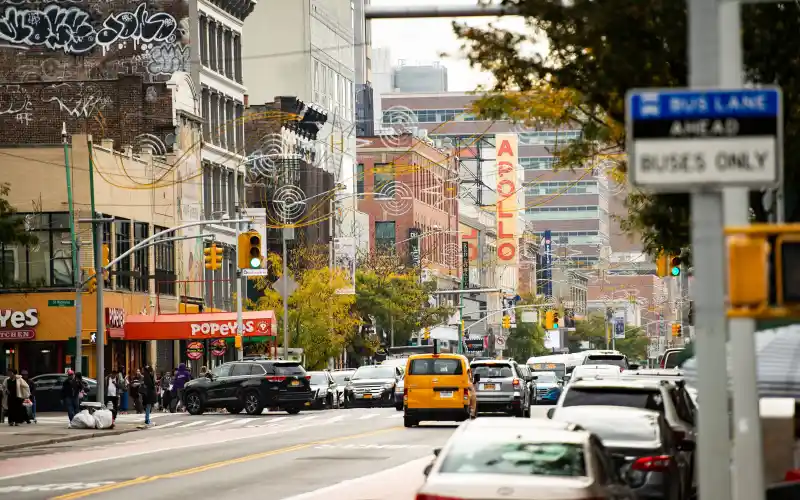Business
Harlem Set To Open First Legal Dispensary

It’s Christmas in Harlem! Or rather: 4/20.
It is a celebratory time in one of New York City’s most historic neighborhoods, which will open its first legal marijuana dispensary next week.
The dispensary, known as Gotham Buds, has a “tentative grand opening” scheduled on September 5 at its location just across the street from the iconic Apollo Theater, according to CBS New York.
The local news station noted that the opening of the business has faced “some pushback from the community.”
A Harlem-based business group called the 125th Street Business Improvement District filed a lawsuit in April with the New York Supreme Court, claiming that the “the process was conducted secretly in order to avoid opposition from the community.”
“We’ve taken this action to really create transparency and to create a channel of communication to understand why this location,” Mukaram Taheraly, chairman of the 125th Street Business Improvement District, said at the time, as quoted by CBS New York.
The station explained that it was “the first case challenging the process state regulators use to choose dispensary locations,” and that the lawsuit “accused the state of violating its own law against having a dispensary within 500 feet of a school, with Touro College, which teaches high school students, just a few doors away.”
But in a statement this week ahead of the scheduled opening of Gotham Buds, the 125th Street Business Improvement District hit a more welcoming note.
“We want all of our Harlem businesses to thrive, so we will do everything in our power to help make this be a success for Gotham Buds and our community,” the group said, as quoted by CBS New York.
New York legalized recreational cannabis for adults in 2021, when then-Gov. Andrew Cuomo signed a measure into law.
Many parts of the law took immediate effect, most notably the provision that enabled those 21 and older to have weed in their possession and to toke up wherever smoking is permitted.
After Cuomo resigned amid allegations of sexual misconduct in August of that year, he was succeeded by Kathy Hochul, who made it a priority to get the regulated marijuana market up and running.
The state’s first legal marijuana dispensary opened in Manhattan’s East Village neighborhood in December of last year.
“We set a course just nine months ago to start New York’s adult-use cannabis market off on the right foot by prioritizing equity, and now, we’re fulfilling that goal,” Hochul said in a statement at the time. “The industry will continue to grow from here, creating inclusive opportunity in every corner of New York State with revenues directed to our schools and revitalizing communities.”
Under an unprecedented social equity initiative, at least the first 100 dispensary licenses awarded in the Empire State are being awarded to individuals with previous cannabis-related convictions.
“New York State is making history, launching a first-of-its-kind approach to the cannabis industry that takes a major step forward in righting the wrongs of the past,” Hochul said in her announcement of the initiative last year. “The regulations advanced by the Cannabis Control Board today will prioritize local farmers and entrepreneurs, creating jobs and opportunity for communities that have been left out and left behind. I’m proud New York will be a national model for the safe, equitable and inclusive industry we are now building.”
Known as the Seeding Opportunity Initiative, the program “guarantees support for future equity applicants, and secures an early investment into communities most impacted by the disproportionate enforcement of cannabis prohibition,” the governor’s office said at the time.
“Our state’s Cannabis Law sets a high goal for creating an equitable industry that puts New Yorkers first,” Cannabis Control Board Chair Tremaine Wright said in the announcement at the time. “The Seeding Opportunity Initiative puts us on a path for achieving that goal and hopefully models a way forward for reaching those goals while building a stable market. I am thankful for the support of Governor Hochul and the Legislature, which made it possible for us to get this initiative off the ground quickly, establish a supply chain from our farmers to equity, retailers, and generate the resources to help revitalize communities that were harmed by the disproportionate enforcement of cannabis prohibition.”
The allocation of dispensary licenses has so far been delayed by legal challenges. In a lawsuit filed earlier this month, a group of military veterans challenged the policy of awarding licenses to those with prior convictions. As a result of the lawsuit, a New York judge extended an injunction on the issuing of additional cannabis dispensary licenses until the matter reaches a resolution.
“That pushes this from being late to the party to potentially exiled from the process,” Brian Burns, an attorney for the plaintiffs, said earlier this month.
“I don’t think you can quantify how being subjected to an unconstitutional program impacts a person,” Burns added.
Source: https://hightimes.com/news/harlem-set-to-open-first-legal-dispensary/
Business
New Mexico cannabis operator fined, loses license for alleged BioTrack fraud

New Mexico regulators fined a cannabis operator nearly $300,000 and revoked its license after the company allegedly created fake reports in the state’s traceability software.
The New Mexico Cannabis Control Division (CCD) accused marijuana manufacturer and retailer Golden Roots of 11 violations, according to Albuquerque Business First.
Golden Roots operates the The Cannabis Revolution Dispensary.
The majority of the violations are related to the Albuquerque company’s improper use of BioTrack, which has been New Mexico’s track-and-trace vendor since 2015.
The CCD alleges Golden Roots reported marijuana production only two months after it had received its vertically integrated license, according to Albuquerque Business First.
Because cannabis takes longer than two months to be cultivated, the CCD was suspicious of the report.
After inspecting the company’s premises, the CCD alleged Golden Roots reported cultivation, transportation and sales in BioTrack but wasn’t able to provide officers who inspected the site evidence that the operator was cultivating cannabis.
In April, the CCD revoked Golden Roots’ license and issued a $10,000 fine, according to the news outlet.
The company requested a hearing, which the regulator scheduled for Sept. 1.
At the hearing, the CCD testified that the company’s dried-cannabis weights in BioTrack were suspicious because they didn’t seem to accurately reflect how much weight marijuana loses as it dries.
Company employees also poorly accounted for why they were making adjustments in the system of up to 24 pounds of cannabis, making comments such as “bad” or “mistake” in the software, Albuquerque Business First reported.
Golden Roots was fined $298,972.05 – the amount regulators allege the company made selling products that weren’t properly accounted for in BioTrack.
The CCD has been cracking down on cannabis operators accused of selling products procured from out-of-state or not grown legally:
- Regulators alleged in August that Albuquerque dispensary Sawmill Sweet Leaf sold out-of-state products and didn’t have a license for extraction.
- Paradise Exotics Distro lost its license in July after regulators alleged the company sold products made in California.
Golden Roots was the first alleged rulebreaker in New Mexico to be asked to pay a large fine.
Source: https://mjbizdaily.com/new-mexico-cannabis-operator-fined-loses-license-for-alleged-biotrack-fraud/
Business
Marijuana companies suing US attorney general in federal prohibition challenge

Four marijuana companies, including a multistate operator, have filed a lawsuit against U.S. Attorney General Merrick Garland in which they allege the federal MJ prohibition under the Controlled Substances Act is no longer constitutional.
According to the complaint, filed Thursday in U.S. District Court in Massachusetts, retailer Canna Provisions, Treevit delivery service CEO Gyasi Sellers, cultivator Wiseacre Farm and MSO Verano Holdings Corp. are all harmed by “the federal government’s unconstitutional ban on cultivating, manufacturing, distributing, or possessing intrastate marijuana.”
Verano is headquartered in Chicago but has operations in Massachusetts; the other three operators are based in Massachusetts.
The lawsuit seeks a ruling that the “Controlled Substances Act is unconstitutional as applied to the intrastate cultivation, manufacture, possession, and distribution of marijuana pursuant to state law.”
The companies want the case to go before the U.S. Supreme Court.
They hired prominent law firm Boies Schiller Flexner to represent them.
The New York-based firm’s principal is David Boies, whose former clients include Microsoft, former presidential candidate Al Gore and Elizabeth Holmes’ disgraced startup Theranos.
Similar challenges to the federal Controlled Substances Act (CSA) have failed.
One such challenge led to a landmark Supreme Court decision in 2005.
In Gonzalez vs. Raich, the highest court in the United States ruled in a 6-3 decision that the commerce clause of the U.S. Constitution gave Congress the power to outlaw marijuana federally, even though state laws allow the cultivation and sale of cannabis.
In the 18 years since that ruling, 23 states and the District of Columbia have legalized adult-use marijuana and the federal government has allowed a multibillion-dollar cannabis industry to thrive.
Since both Congress and the U.S. Department of Justice, currently headed by Garland, have declined to intervene in state-licensed marijuana markets, the key facts that led to the Supreme Court’s 2005 ruling “no longer apply,” Boies said in a statement Thursday.
“The Supreme Court has since made clear that the federal government lacks the authority to regulate purely intrastate commerce,” Boies said.
“Moreover, the facts on which those precedents are based are no longer true.”
Verano President Darren Weiss said in a statement the company is “prepared to bring this case all the way to the Supreme Court in order to align federal law with how Congress has acted for years.”
While the Biden administration’s push to reschedule marijuana would help solve marijuana operators’ federal tax woes, neither rescheduling nor modest Congressional reforms such as the SAFER Banking Act “solve the fundamental issue,” Weiss added.
“The application of the CSA to lawful state-run cannabis business is an unconstitutional overreach on state sovereignty that has led to decades of harm, failed businesses, lost jobs, and unsafe working conditions.”
Business
Alabama to make another attempt Dec. 1 to award medical cannabis licenses

Alabama regulators are targeting Dec. 1 to award the first batch of medical cannabis business licenses after the agency’s first two attempts were scrapped because of scoring errors and litigation.
The first licenses will be awarded to individual cultivators, delivery providers, processors, dispensaries and state testing labs, according to the Alabama Medical Cannabis Commission (AMCC).
Then, on Dec. 12, the AMCC will award licenses for vertically integrated operations, a designation set primarily for multistate operators.
Licenses are expected to be handed out 28 days after they have been awarded, so MMJ production could begin in early January, according to the Alabama Daily News.
That means MMJ products could be available for patients around early March, an AMCC spokesperson told the media outlet.
Regulators initially awarded 21 business licenses in June, only to void them after applicants alleged inconsistencies with how the applications were scored.
Then, in August, the state awarded 24 different licenses – 19 went to June recipients – only to reverse themselves again and scratch those licenses after spurned applicants filed lawsuits.
A state judge dismissed a lawsuit filed by Chicago-based MSO Verano Holdings Corp., but another lawsuit is pending.
Source: https://mjbizdaily.com/alabama-plans-to-award-medical-cannabis-licenses-dec-1/
-

 Business2 years ago
Business2 years agoPot Odor Does Not Justify Probable Cause for Vehicle Searches, Minnesota Court Affirms
-

 Business2 years ago
Business2 years agoNew Mexico cannabis operator fined, loses license for alleged BioTrack fraud
-

 Business2 years ago
Business2 years agoAlabama to make another attempt Dec. 1 to award medical cannabis licenses
-

 Business2 years ago
Business2 years agoWashington State Pays Out $9.4 Million in Refunds Relating to Drug Convictions
-

 Business2 years ago
Business2 years agoMarijuana companies suing US attorney general in federal prohibition challenge
-

 Business2 years ago
Business2 years agoLegal Marijuana Handed A Nothing Burger From NY State
-

 Business2 years ago
Business2 years agoCan Cannabis Help Seasonal Depression
-

 Blogs2 years ago
Blogs2 years agoCannabis Art Is Flourishing On Etsy











